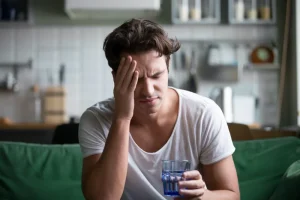
If you choose to drink alcohol, try to avoid it too close to bedtime. Without treatment, sleep apnoea can lead to type 2 diabetes, depression, high blood pressure and increase your chance of having a stroke. It may also affect your mood and concentration, and make it more likely you will have an accident because you’re tired.
Why You Should Limit Alcohol Before Bed for Better Sleep
People who abuse alcohol long-term don’t seem to display the deep recovery sleep that most people show after sleep deprivation, suggesting that the homeostatic drive is no longer functioning as it should. During a normal night of sleep, we cycle through periods of light sleep, deep sleep, and rapid eye movement (REM) sleep. Each sleep stage plays an essential function, but deep sleep and REM sleep are considered the most important stages for physical and mental restoration.

How Alcohol Affects Sleep & Exercise
Alcohol will undoubtedly help to send you off to sleep as it actually works on the same receptors in the brain that are targeted by some sleeping tablets. Peters is a board-certified neurologist and sleep medicine specialist and is does alcohol help you sleep a fellow of the American Academy of Sleep Medicine. If you have concerns about your sleep or alcohol use, talk to your health care provider – they can help evaluate your routines and sleep to note if adjustments should be made.
- The major caveat here is that people metabolize caffeine at different rates, so a post-dinner espresso affects different people differently.
- No one food is a magic bullet, but these can help you get some much-needed rest.
- When you drink alcohol, you may find you have to get up in the night to go to the toilet.
- So, does alcohol help you sleep or is it actually interfering with your quality of rest?
- Drinking alcohol reduces your sleep onset latency (SOL), or the amount of time it takes to fall asleep.
Top 6 Bedtime Mocktails for Sleep
When drinking before bed, be mindful of the potential to develop symptoms of insomnia. This can become a habit that can create an unhealthy reliance on alcohol. Since alcohol affects everyone differently, it’s important to understand where your limit lies and how much alcohol you can drink before it starts to affect your sleep. If you’re looking for ways to improve your sleep, an easy place to start is by adopting https://ecosoberhouse.com/ healthy sleep hygiene habits such as keeping a consistent sleep schedule and creating a calming bedroom environment. Many people turn to alcohol to cope with difficult feelings, but alcohol may end up having the opposite effect if it interferes with sleep. For example, people with moderate or severe anxiety who use alcohol in hopes of sleeping better are actually more likely to have sleep problems.
They have sensors to monitor your body temperature changes overnight and Autopilot to heat or cool your sleep surface while you remain in deep and REM sleep. This article presents information about sleep disorders, of which there are many types, some quite common and others less so. Knowing this information can help you and your healthcare provider determine a diagnosis and a course of action. “It’s possible that a vitamin D or magnesium deficiency can interrupt sleep. Some evidence also shows that people low in vitamins E and C, and B12 and B6 might also suffer from more sleep problems,” says Axe. “Each of these nutrients affects sleep cycles in a different way, such as by playing a role in your circadian rhythm and body’s ability to produce melatonin and other calming chemicals.” We’ll try anything to sleep better, from taking sleep supplements like melatonin to changing bedtime routines.

Contract your pelvic muscles for three to five seconds, then release and relax for three to five seconds. If you’re urinating frequently at night, you might find some relief by limiting your caffeine intake during the day. In general, experts recommend cutting off your caffeine consumption by noon — or at least avoiding caffeine in the second half of the day. The problem arises if you find yourself relying on alcohol to get you to sleep.
- Alcohol appears to consistently delay the first REM sleep episode, and higher doses of alcohol appear to reduce the total amount of REM sleep.
- The typical sleep cycle begins with three non-rapid eye movement (NREM) stages of sleep and ends with rapid eye movement (REM).
- As many as three quarters of people with alcohol dependence experience insomnia symptoms when they drink.

